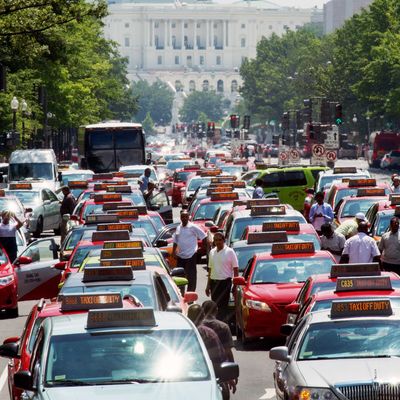
This week, Uber announced that it has hired David Plouffe, Obama’s former campaign manager, as its senior vice-president of policy and strategy.
At first blush, it seems a funny choice. Uber has thus far been running a libertarian-inflected insurgency against the city councils and taxi associations that pose the biggest challenge to its plans for cab-hailing domination. Its most visible political support has come from conservatives, among them Rand Paul, Marco Rubio, and the Republican National Committee. Democrats have been much more quiet.
“Across the country, taxi unions and liberal government bureaucrats are setting up roadblocks, issuing strangling regulations and implementing unnecessary red tape to block Uber,” an RNC petition in support of Uber reads. “We must stand up for our free market principles, entrepreneurial spirit, and economic freedom.”
But for Uber, the Plouffe hire is a pragmatic choice. The company might be fighting a conservative fight. But it is doing so almost exclusively in liberal waters, and it will be liberal politicians and regulators it needs to win over if it wants to keep expanding.
That is in no small part because Uber is an urban phenomenon, operating mainly in the kinds of big cities that skew liberal both in composition and in governance. And for the politicians and regulators within those big cities, Uber has become an extraordinarily divisive issue, pitting Uber’s often-liberal supporters against its often-liberal detractors.
Local pols are hearing from yuppie iPhone owners with disposable income to burn who want unfettered access to the app. They are hearing from working-class cab drivers that stand to see their livelihoods hurt by Uber’s expansion. They are hearing from the lobbyists and union leaders advocating for those cab drivers. They are hearing from low-income or unemployed workers who want in on the gig-economy jobs the company helps to create. They are also hearing from Uber’s drivers, many of whom have grievances with the company’s pay and policies.
Uber has won many of its local regulatory battles, but not without raising the kind of questions about class and jobs that make liberals queasy. What if Uber creates jobs, but only crummy low-wage jobs, and only by destroying existing jobs that were pretty low on the income scale to begin with? “What about guaranteeing ride availability at a ‘reasonable price’ coupled with the ability of the driver to earn a living?” asked Sally Clark of the Seattle City Council, which has legalized the app. “Protect the low-income person? Protect the immigrant? Sure, just tell me which one.”
Enter Plouffe, now in charge of “UBER THE CANDIDATE,” as the company’s chief executive, Travis Kalanick put it in a blog post. He’s a guy who knows how to manage data. He’s a guy who knows how to run a liberal ground game. He’s a guy who knows labor politics and wedge issues and what fires people up. And he’s a guy who knows how to use social media to activate liberal urbanites — liberal urbanites who might not be terribly involved in the local political process but can make their voices awfully loud when they want to.
His announcement gives some sense of how he might pitch the company to the cities still contemplating what to do about the service. He gives the standard conservative applause-line, arguing that Uber is a start-up facing regulatory harassment from entrenched incumbents. (I’ll note that many liberals agree on that point.) Uber “poses a threat to some, and I’ve watched as the taxi industry cartel has tried to stand in the way of technology and big change,” Plouffe wrote. “Ultimately, that approach is unwinnable. But I look forward to doing what I can right now to ensure drivers and riders are not denied their opportunity for choice in transportation.”
But he also makes a softer-gentler argument that might have more liberal appeal: that Uber will benefit consumers across the income spectrum, not just rich ones, while also creating lots of work on net. “As Uber succeeds like I believe it can, it will spur the creation of hundreds of thousands of small businesses and directly create millions of jobs,” Plouffe said. He added that it will “deliver rapid, easy and affordable transportation alternatives to workers, parents, businesses and people out having a good time.”
In many places, it will be a tough fight to win. But Plouffe’s ability to harness liberal public support for Uber as a service for consumers and a provider of jobs might help overcome concerns about the workers it might leave behind. And if the liberal-led campaign for Candidate Uber falters, at least conservatives have Plouffe’s back.





























